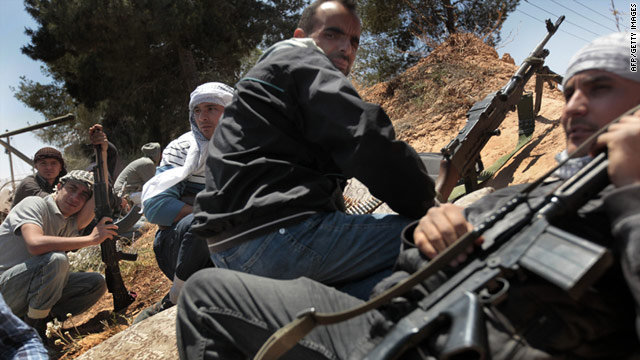Libyan rebels advancing 'meter by meter' in Misrata, witness reports

- NEW: Gadhafi's gunners pound Misrata neighborhoods, journalist says
- NEW: Despite the bombardment, the rebels "are not giving up an inch"
- A Red Cross aid ship docks in Misrata, while U.S. aid reaches Benghazi
- 54 Somalis are dead or feared dead in the latest refugee boat tragedy from Libya
(CNN) -- Rebel forces defending the Libyan city of Misrata from government troops are making "meter-by-meter" gains despite heavy shelling and rocket attacks, a Western journalist inside the city said Tuesday.
Units that remain loyal to longtime Libyan strongman Moammar Gadhafi have been firing rockets and artillery shells into residential neighborhoods, leaving a nearby emergency room full of women, children and old men, Marie Colvin, the Middle East correspondent for Britain's Sunday Times, told CNN.
"The rebels are very much trying at a minimum to push back Gadhafi's lines so he simply can't do that," Colvin said. Meanwhile, the rebels are asking why NATO forces aren't targeting the pro-Gadhafi gunners.
NATO warplanes and missiles have been pounding Gadhafi's forces since March as Gadhafi's troops try to quash a nearly 3-month-old revolt against his regime. In Misrata, two months of fighting and the ongoing shelling of the city's port have prevented most aid ships from docking there, leaving the city "at the forefront" of U.N. humanitarian concerns, a top U.N. official told the Security Council on Monday.
 Libya's humanitarian crisis
Libya's humanitarian crisis
 Alleged rape victim flees Libya
Alleged rape victim flees Libya
 Food, water running short in Misrata
Food, water running short in Misrata
 Libyan rebels: Short on guns, ammo
Libyan rebels: Short on guns, ammo
A ship carrying aid from the International Committee of the Red Cross docked in Misrata on Tuesday, but the ongoing fighting has deterred many captains from trying to enter the port, Colvin said. The ICRC said the vessel carried medical supplies, spare parts to repair water and electrical supply systems and 8,000 jars of baby food.
Meanwhile, on the front lines of the battle, bullets are whizzing past "like very angry hornets," Colvin said. At least 70 rebels have been wounded -- but they have held their line, "and meter by meter were able to advance," she said.
"They're defending their homes. They're defending their families, and they are not giving up an inch. They are fighting," Colvin said.
The first shipment of nonlethal aid from the United States to the Libyan opposition arrived Tuesday in Benghazi, U.S. State Department spokesman Mark Toner said. It included more than 10,000 MREs -- meals ready to eat -- that are halal, permissible under Islamic law. Other items en route from the U.S. Defense Department include medical supplies, tents, uniforms, boots and personal protective gear.
U.S. officials are coordinating with the opposition Transitional National Council "to determine what additional assistance requirements we might be able to support in the coming weeks," Toner said.
Almost 750,000 people have fled the country amid the fighting, and another 58,000 are displaced within Libya, Valerie Amos, the U.N. undersecretary-general for humanitarian affairs, told the Security Council on Monday. Another 5,000 are stranded at border crossings between Libya, Tunisia and Niger, Amos said.
Others have tried to flee by sea, but one such attempt appears to have ended in disaster for hundreds of refugees as their ship capsized off the capital, Tripoli.
Somalia's ambassador to Libya, Abdelghani Mohamed Oweys, said the vessel that overturned Friday was carrying more than 600 asylum seekers from various Arab and African nationalities, including 240 Somalis. The total number of casualties is unknown, but Oweys said at least 54 Somalis were dead or feared dead Tuesday.
Laura Boldrini, spokeswoman for the Office of the U.N. High Commissioner for Refugees in Italy, said 16 bodies had been pulled out of the water from the Tripoli harbor.
"From what refugees are telling us, the Libyan authorities are facilitating the departures of non-Libyan citizens from Libyan coasts," Boldrini said. "Refugees are not considered at all as humans. Trips are organized on unlikely vessels, and they leave Libya without considering the weather forecast."
Since the end of March, two vessels departing from Libya have disappeared -- one carrying 320 people and the other 160, Boldrini said. In addition, "We know of a shipwreck on April 4, where 250 people died," Boldrini said.
Fighting between government and rebel troops also raged on in al-Brega, a key oil town in eastern Libya. Three rebels have died in clashes with Gadhafi forces since Monday, according to rebel spokesman Mostafa Bozen and a rebel fighter on the front lines, who spoke to CNN on condition of anonymity for safety reasons.
Al-Brega is held by pro-Gadhafi forces, and the rebels have made multiple unsuccessful attempts to enter the town, the sources said.
CNN's Nima Elbagir, Jomana Karadsheh, Antonia Mortensen, Sara Sidner and Amir Ahmed and journalist Livia Borghese contributed to this report.
